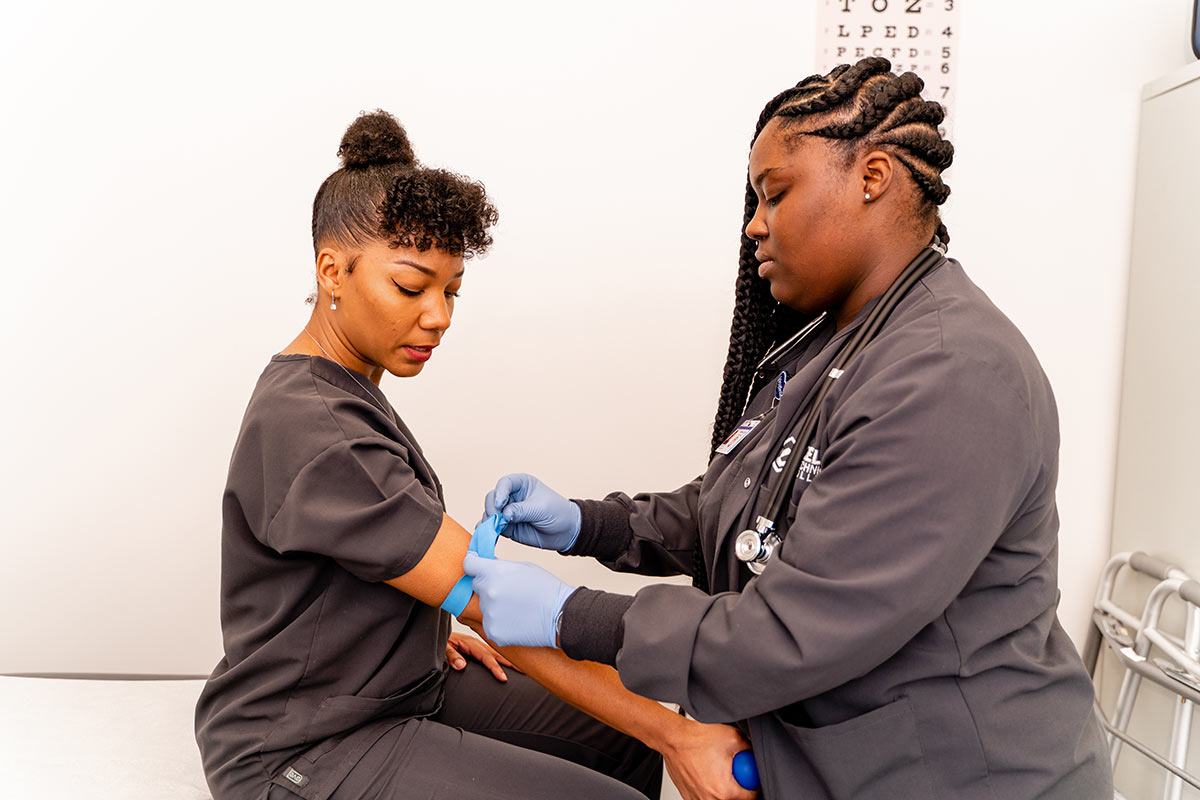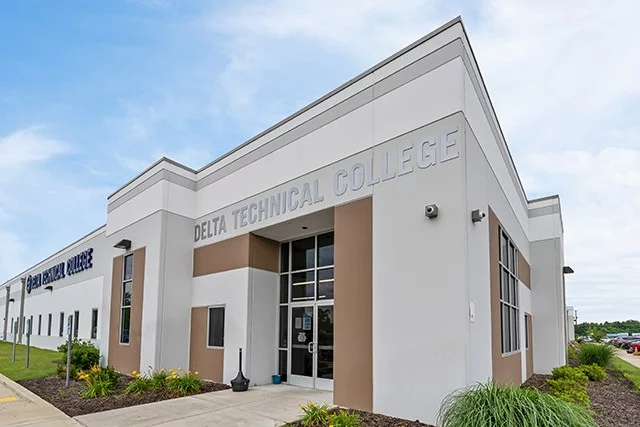Ready to Learn More?
DTC is Here to Help
DTC’s Admissions Team will reach out to answer any questions you have and share next steps!
What Makes DTC's Phlebotomy Course Different?
Hands-On Focused
Labs that simulate real Phlebotomy working environments
Accelerated Training
Complete your Phlebotomy training in just 5 weeks
Experienced Instructors
All DTC Phlebotomy instructors have real-world experience
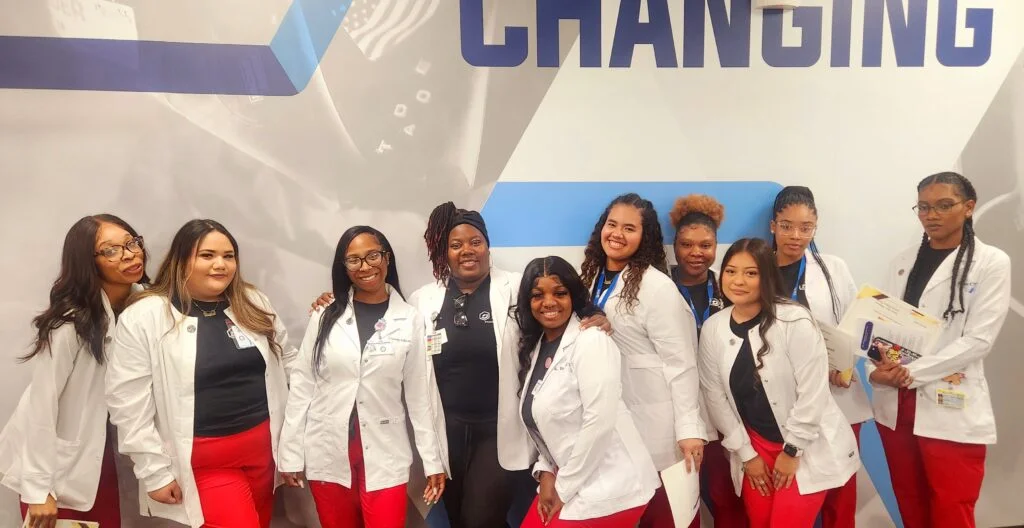
Daytime Classes Available
Flexible class times that work for your busy schedule
Employment Preparation
No general education courses required, students will learn the skills required for entry-level employment
Career Placement
Career counseling & placement assistance is available to all qualified graduates
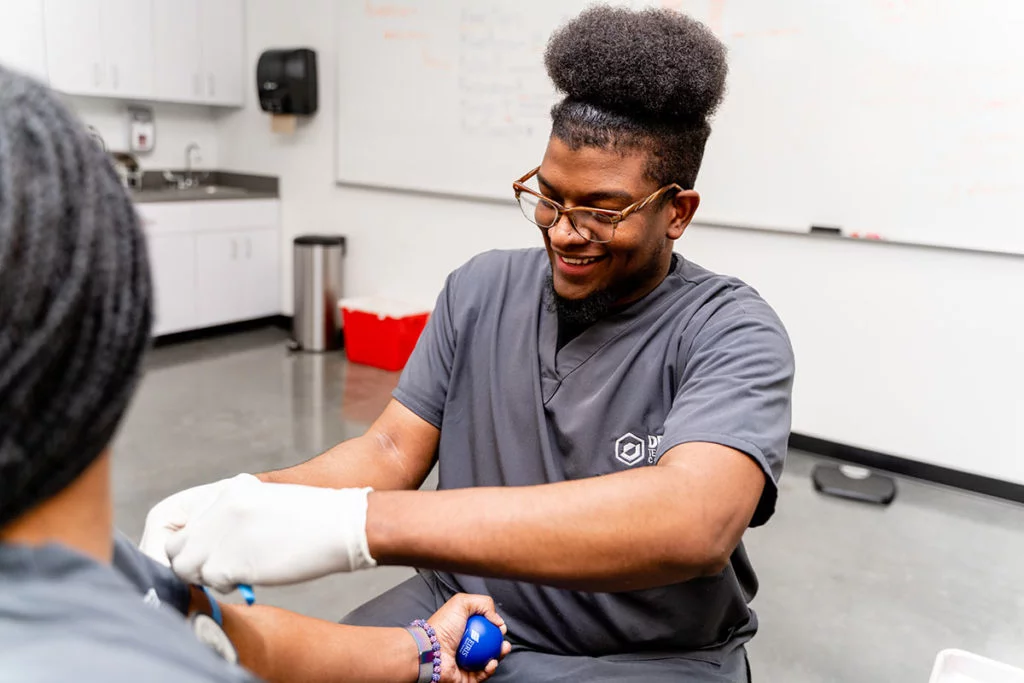
HANDS-ON PHLEBOTOMY TRAINING COURSE
Phlebotomy Practice and Quality Assessment | Professional Ethics, Legal, and Regulatory Issues | Infection Control | Medical Terminology
The phlebotomy instructors at DTC bring real-world experience to the classroom and lab, where you will be trained in the following:
- Anatomy and Physiology of Organ Systems
- Venipuncture Procedures
- Capillary Blood Specimens
- Specimen Handling, Transportation, and Processing
- Pediatric and Geriatric Procedures
- Point-of-Care Collections
- Blood Cultures
- Urinalysis, Body Fluids, and Other Specimens
- Arterial, Intravenous (IV), and Special Collection Procedures
- Safety and First Aid
The Phlebotomy Course prepares students to take the NCCT (National Center for Competency Testing) certification exam necessary to become a Certified Phlebotomy Technician (CPT). Students will also be certified in CPR, AED, and first aid.
Phlebotomy Course at Delta Technical College – Learn Phlebotomy
Phlebotomists work directly with patients, so phlebotomy skills include both clinical duties as patient education. Phlebotomists handle many different responsibilities, which require various skills including:
Clinical Duties:
- Capillary Blood Specimens
- Blood Cultures
- Urinalysis, Body Fluids, and Other Specimens
- Arterial, Intravenous (IV), and Special Collection Procedures
- Specimen Handling, Transportation, and Processing
Patient and Theoretical Knowledge:
- Professional Ethics, Legal, and Regulatory Issues
- Medical Terminology
- Anatomy and Physiology of Organ Systems
- Patient Education
- Coaching Patients Through the Process
- Safety and First Aid
Ready to Learn More?
Ready to learn more about DTC’s hands-on training programs? Give us a call or fill out the form to get more information.
Scholarship Opportunities

DTC is here to help you attain the funding you need to take the next step in your education. DTC’s Financial Aid Team can help match you with scholarship opportunities you may qualify for.
Is a Career in Phlebotomy Right for You?
Are you considering a career in phlebotomy? The first step is finding the right phlebotomy course near you. DTC’s Phlebotomy Course is an accredited phlebotomy training program that will prepare you to become a certified phlebotomist in less than 6 weeks.
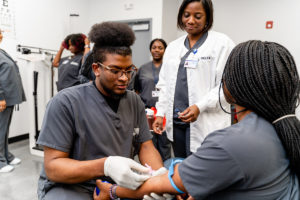
Is phlebotomy the right career for you? Consider the following:
- Phlebotomists should be compassionate, because some patients will be afraid of needles and phlebotomists need to create a kind, soothing environment.
- Patience is also helpful when dealing with different types of patients. The time it takes to draw blood can vary by patient, depending upon a number of physical and/or emotional factors, such as fear of needles.
- Attention to detail is important for phlebotomists. A phlebotomist is responsible for assembling and maintaining all the equipment for phlebotomy, including needles, tests tubes, and blood vials. Correctly labeling the samples and entering patient information into databases is a primary part of being a phlebotomist.
If you are detail-oriented, patient, and compassionate, phlebotomy may be a great fit for your future career.
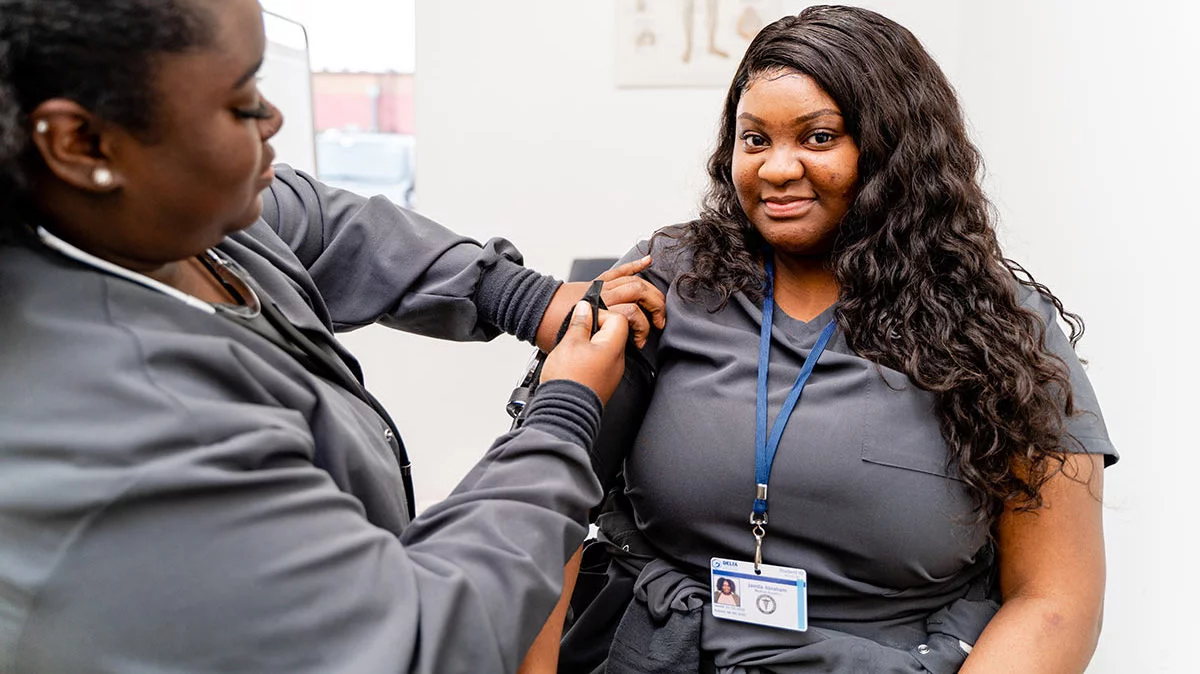
Ready to Learn More?
Ready to learn more about DTC’s hands-on training programs? Give us a call or fill out the form to get more information.
Get StartedFind Phlebotomy Classes Near You
Delta Technical College offers phlebotomy training in Mississippi:
PHLEBOTOMY COURSE OVERVIEW
QUICK FACTS: PHLEBOTOMY COURSE
The primary responsibility of a phlebotomist is to draw blood from patients for tests, transfusions, research, or blood donations. Phlebotomists sometimes have to educate their patients and provide assistance if a patient has adverse reactions after their blood is drawn. Source: U.S. Bureau of Labor Statistics
HOW MUCH DO PHLEBOTOMISTS MAKE?
The median annual wage for phlebotomists was $41,810 in May 2023, as reported by the U.S. Bureau of Labor Statistics (BLS).
WHERE CAN I WORK AS A PHLEBOTOMIST?
The largest employer of phlebotomists is hospitals, however they can also work in medical and diagnostic laboratories, ambulatory healthcare services, physicians’ offices, or outpatient care centers. Source: U.S. Bureau of Labor Statistics
Phlebotomist employment is projected to grow 8% through 2033, according to the U.S. Bureau of Labor Statistics (BLS), which is faster than the average for all occupations (4%). That’s likely due to the demand for bloodwork in hospitals, labs, donor centers, etc. Blood analysis is considered an essential function in medical laboratories and hospitals. The demand for phlebotomists is expected to remain high, and the job prospects are greatest for certified phlebotomists. Source: U.S. Bureau of Labor Statistics
HOW MUCH DOES PHLEBOTOMY TRAINING COST?
The total cost of Delta Technical College’s Phlebotomy Course, including books and supplies, is $2,350. For more information on program costs, please contact your local DTC campus.
Check out the Phlebotomy FAQ for the answers to frequently asked questions about phlebotomists!
Enrollment & Outcomes
Enrollment and outcome information for all Mississippi-based campuses and the ACCSC annual reports for each program in Adobe PDF format. Please note, all programs are not offered at all campuses.
Accreditations
- DTC is accredited by the Accrediting Commission of Career Schools & Colleges (ACCSC).
- DTC is approved by the U.S. Department of Education to participate in federally-funded financial aid programs.

Delta Technical College is licensed by the Mississippi Commission on Proprietary Schools and College Registration, Certificate No. C-624. Licensure indicates only that minimum standards have been met; it is not an endorsement or guarantee of quality. Delta Technical College is authorized for operation as a postsecondary educational institution by the Tennessee Higher Education Commission.
Licensure indicates only that minimum standards have been met; it is not an endorsement or guarantee of quality.
Delta Technical College is authorized for operation as a postsecondary educational institution by the Tennessee Higher Education Commission.
